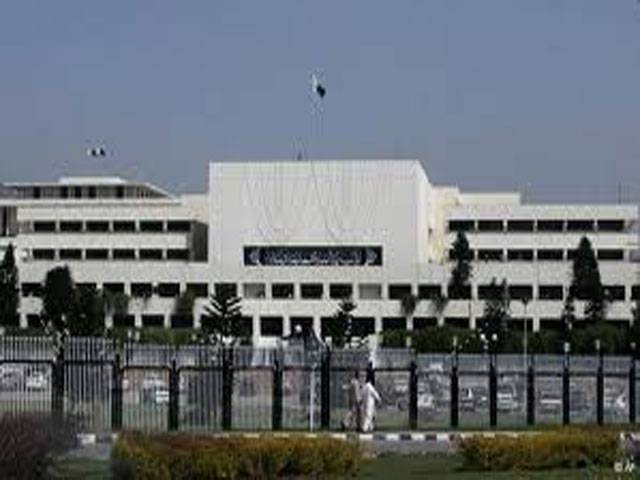ISLAMABAD - The senate standing committee on interior Monday deferred a controversial anti-terrorism bill for a day after all its members opposed to giving powers to law enforcement agencies (LEAs) and armed forces to shoot the suspects on sight.
The senate panel has been discussing the Anti-Terrorism (Amendment) Bill, 2014 since last week. The bill was referred to it on March 7 last and if the upper house did not pass the bill till June 5, it will go to the joint sitting of the parliament as mentioned in the constitution. The national assembly has already passed this bill and it will complete 90 days period in the Senate on June 5.
All the committee members opposed one clause of the bill tooth and nail that gives powers to police, armed forces and civil armed to shoot suspects on sight as MQM lawmakers Tahir Mashhadi said, "The government wants to bailout police who is murder of innocent people through this legislation and increase corruption in LEAs." He proposed that such powers should only be given to an officer of grade-17 from police or army and such action should be taken in his presence.
On demand of the committee members, chairman committee Senator Talha Mahmood ruled that the committee would meet tomorrow (Tuesday) in the morning to deliberate upon the clause-by-clause of the bill after Federal Minister for Science and Technology Zahid Hamid briefed the committee on the proposed bill. The meeting also decided that at least two legal experts, probably Senator Mian Raza Rabbani and former chairman Senate Waseem Sajjad, would be invited in the committee to have their input on the bill.
The committee termed some clauses of the proposed bill very good including protection of witnesses and judges and recording of statements of accused through video link from jail. Sardar Fateh Muhamad Hasseni of PPP questioned whether the proposed bill was a specific law for Karachi or for the whole country.
Zahid Hamid while giving briefing to committee said that the government had proposed this law as a result of the decision of the cabinet meeting held in Karachi.
He said that a committee comprising representatives of political parties had proposed for such a stringent law to curb terrorism in the country. He said that self-defence has been part of the law since British era and in the pervious law there was power that security agencies would not fire unless they would be fired upon, this was loophole in the law and the government wanted to give them powers to shoot but with safe guards.
Zahid Hamid said that there were built-in safeguards in the law as internal inquiry would be held if security agencies would kill any suspect. There should be reasonable cause and pre-warning for the action, he added.
Mashhadi said that officials usually mange internal inquiries into their favour.
"The idea was to effectively implement the terrorism law by amending previous Anti-Terrorism Act (ATA), 1997...'shooting-on-sight' part of the law was highlighted and other good clauses were overshadowed," Hamid said. He said that the law was for all Pakistan with broad canvass including transfer of terrorism cases, protection of judges and witnesses.
However, the chairman committee said that the government was giving discretionary powers to security agencies and detention period was also being increased from 30 to 90 days. "We have no haste to pass the bill," he remarked.
"The purpose was to increase the conviction rate that was almost zero in the past," the federal minister said in the presence of State Minister for Interior Baleegur Rehman. He said under the law, screens would be placed in courts to protect judges and witnesses, to conceal their identity, the trial of accused could be held through video link from jail and a witness protection programme would be launched.
Shahi Syed of ANP complained said that the ministry of interior had withdrawn his security and if any untoward incident happened to him, the minister of interior and the ministry would be responsible for that.
Gul Mohammad proposed that a ban should be lifted on issuance of arms licences to parliamentarians on monthly quota basis and a condition of special permission should be waived off for the purchase of the weapons from POF Wah.
Chairman Talha Mahmood said that ministry of interior was not even giving permission to his private guards to carry weapons after withdrawal of official security from him.
Friday, April 19, 2024
Senate panel opposes shoot on sight powers for LEAs
Anti-terrorism bill

Caption: Senate panel opposes shoot on sight powers for LEAs
9:07 PM | April 18, 2024
King Charles's cancer ‘eating him alive,' monarch unable to perform duties: Insider
1:02 AM | April 19, 2024
Mehwish Hayat says she would like to work with Aamir Khan
9:59 PM | April 18, 2024
What caused record-breaking rainfall in UAE?
9:58 PM | April 18, 2024
Donald Trump discusses Ukraine, Middle East, NATO with Polish President Duda
9:57 PM | April 18, 2024
'That'll be awesome,' Rohit Sharma on idea of Pakistan vs India Test series
9:17 PM | April 18, 2024
Hepatitis Challenge
April 18, 2024
IMF Predictions
April 18, 2024
Wheat War
April 18, 2024
Rail Revival
April 17, 2024
Addressing Climate Change
April 17, 2024
Justice denied
April 18, 2024
AI dilemmas unveiled
April 18, 2024
Tax tangle
April 18, 2024
Workforce inequality
April 17, 2024
New partnerships
April 17, 2024
ePaper - Nawaiwaqt
Advertisement
Nawaiwaqt Group | Copyright © 2024





